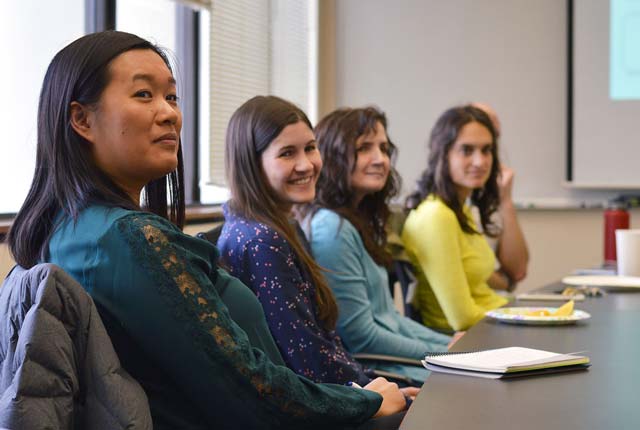Close Relationships and Interpersonal Processes
Humans are fundamentally social animals: we strive for acceptance and connectedness with others, and we fear rejection and loss. Relationships are therefore central to many of our most meaningful life experiences, both positive and negative.
The University of Utah is home to a diverse group of researchers with a shared emphasis on close relationships and interpersonal processes. We tackle research questions such as:
- How and why do people maintain ambivalent social ties: relationships that are high in both positivity and negativity? What are the consequences of relationship ambivalence for health and well-being?
- To what extent do people take their partner’s feelings into consideration when they decide whether to maintain a relationship? What are the consequences of staying in a relationship for the sake of the partner?
- Are dispositionally happy people also better at navigating close relationships?
- How do friends and partners learn about each other’s attitudes? To what extent is greater attitude familiarity beneficial for relationships?
- How do people benefit from their close relationships during stressful times? How do the particular ways that individuals benefit from their relationships vary depending on their cultural background?
People
Social Area Faculty
Affiliated Faculty
Papers Related to Research Questions
- How and why do people maintain ambivalent social ties: relationships that are high in both positivity and negativity? What are the consequences of relationship ambivalence for health and well-being?
Birmingham, W., Uchino, B.N., Smith, T.W., Light, K.C., & Butner, J. (2015). It's complicated: Marital partner’s perceptions of ambivalent behavior on ambulatory blood pressure and daily interpersonal functioning. Annals of Behavioral Medicine, 49, 743-753.
Joel, S., MacDonald, G., & Shimotomai, A. (2011). Conflicting pressures on relationship commitment for anxiously attached individuals. Journal of Personality, 59, 51-74.
Uchino, B.N., Smith, T.W., & Berg, C.A. (2014). Spousal relationship quality and cardiovascular risk: Dyadic perceptions of relationship ambivalence are associated with coronary calcification. Psychological Science, 25, 1037-1042.
- Are dispositionally happy people also better at navigating close relationships?
Diener, E. (2013). The remarkable changes in the science of subjective well-being. Perspectives on Psychological Science, 8, 663-666.
Diener, E., & Seligman, M. E. (2002). Very happy people. Psychological Science, 13, 81-84.
- How do friends and partners learn about each other’s attitudes? To what extent is greater attitude familiarity beneficial for relationships?
Sanbonmatsu, D.M., Uchino, B.N.*, & Birmingham, W. (2011). On the importance of knowing your partner's views: Attitude familiarity is associated with better interpersonal functioning and lower ambulatory blood pressure in daily life. Annals of Behavioral Medicine, 41, 131-137.
Sanbonmatsu, D. M., Uchino, B. N.*, Wong, K. K., & Seo, J. Y. (2012). Getting along better: The role of attitude familiarity in relationship functioning. Social Cognition, 30, 350-361.
- How do people benefit from their close relationships during stressful times? How do the particular ways that individuals benefit from their relationships vary depending on their cultural background?
Chen, J.M., Kim, H.S., Mojaverian, T., & Morling, B. (2012). Culture and social support provision: Who gives what and why. Personality and Social Psychology Bulletin, 38(1), 3-13.
Chen, J.M., Kim, H.S., Sherman, D.K., & Hashimoto, T. (2015). Culture and social support provision: The importance of relationship quality. Personality and Social Psychology Bulletin, 41, 1575-1589.
Uchino, B.N., Kent de Grey, R.G., & Cronan, S. (2016). The quality of social networks predicts age-related changes in cardiovascular reactivity to stress. Psychology and Aging, 31, 321-326.
Relevant Course Offerings
Graduate Courses
- PSY 6260 – Social Development Across the Lifespan
- PSY 6410 – Advanced Social Psychology
- PSY 6420 – Methods in Social Psychology
- PSY 6890 – Social Psychology Research Group
- PSY 7240 – Relationships and Health over the Lifespan
- PSY 7964 – Social Psychological Approaches to Close Relationships and Interpersonal Processes
In addition to our social area seminars, we recommend that graduate students explore our department’s vast range of course offerings in statistics and methodology, including:
- PSY 6520 – Psychological Measurement
- PSY 6550 – Structural Equation Modeling
- PSY 6551 – Advanced Structural Equation Modeling
- PSY 6556 – Analysis of Temporal Data
- PSY 6558 – Multilevel Modeling
- PSY 6895 – Advanced Methodological and Statistical Issues in Dyadic Research
Undergraduate Courses
- PSY 2800 – Psychology of Love
- PSY 3245 – Human Sexuality in a World of Diversity
- PSY 3410 – Social Psychology
- PSY 3960 – Psychology and Social Issues
- PSY 4963 – Honors Topics in Personality and Social Psychology
- PSY 5260 – Social Development Across the Lifespan
- PSY 5410 – Advanced Social Psychology
Undergraduate students: we also have independent study courses designed to help you gain research experience. Email a faculty member directly for more information about working in their lab.
Additional Resources
Shared Behavioral Coding Space (SOCS)
A shared computer lab for processing physiological and behavioral data, with software such as AcqKnowledge and ObserverXT
International Association for Relationship Research
